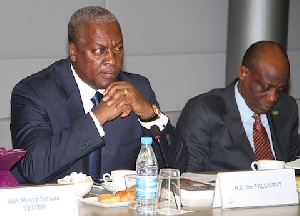Business News of Friday, 27 February 2015
Source: starrfmonline.com
IMF bailout or not, 2015 will be a difficult year – Econs Prof
Despite a near $1-billion deal reached between the Government of Ghana and the International Monetary Fund (IMF) towards rescuing the ailing economy of the young oil-producing West African country, 2015 will be a difficult year for the major cocoa and gold producer, Economist and Professor of Econometrics, Kodwo Ewusi has told Morning Starr host Kafui Dey on Starr 103.5FM.
The Dean of Graduate Studies at the Methodist University College (MUC) said although the $940-million deal will give support to Ghana’s balance of payment, as well as help open the country up to donor opportunities, the conditionalities of the IMF package, coupled with the sharp fall in the price of crude oil on the world market will conspire with other adverse factors to give Ghana a tough 2015.
“The IMF is going to make life even more difficult because it’s saying we should cut wages, we should cut expenditure, so usually when an IMF programme comes, there is some economic hardship before we get into the recovery and this has happened to Greece,” Prof Ewusi observed.
He said Government’s public admittance that the country will lose about $700 million in projected revenue for 2015 as a result of the fall in oil prices also portends ill consequences for the economy.
Additionally, Prof Ewusi said Government’s introduction of new taxes on the petroleum sector coupled with the reluctance of the Government to reduce fuel prices proportionally to reflect the situation on the world market, will make life a bit uncomfortable for Ghanaians.
“So our problems of rising deficits on the fiscal side, rising deficits on import or trade merchandise, rising deficits on current accounts will be exacerbated by the reduction in the price of oil, so it seems to me that 2015 is going to be a difficult year, so come IMF or not, it is really the management of the economy by the Government which will tell whether Ghanaians will feel relieved or not,” the Fellow of the Ghana Academy of Arts and Sciences stressed.
The former Director of the Institute of Statistical Social and Economic Research (ISSER) and Vice-Chancellor of the West End University College also wondered why the country still had to run to the IMF for respite despite being an oil economy.
“I think that it is unfortunate that with the advent of oil from the jubilee field, we still had to go. Because I think when the oil started being produced at jubilee, it means more revenue was coming in, the growth of the economy was ratcheted to 14.5 per cent but then the growth declined to 8.8 percent in 2012; 7.6 percent in 2013; and 4.2 per cent in 2014 so it means that the management…impact is not being felt as greatly as it should,” Prof Ewusi who has consulted for the International Labour Organisation (ILO), Food and Agriculture Organisation (FAO), the World Bank (WB) and the United Nations Development Programme (UNDP) said.











